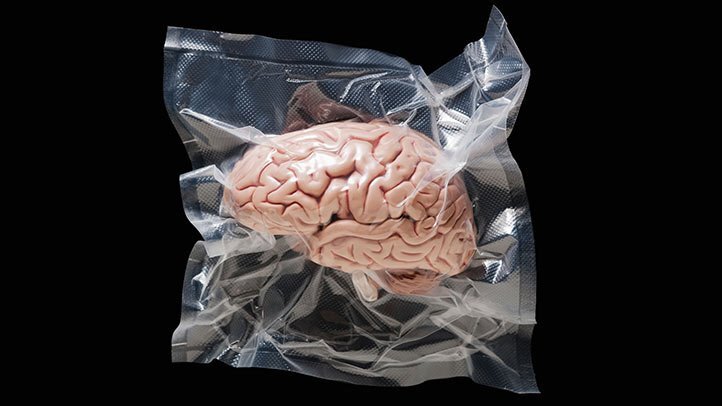Stress Can Shrink Your Brain
by Dan Rauf for Everyday Health:Chronic stress can deliver a damaging blow to a person’s health. It can have a negative impact on the cardiovascular system, breathing, the liver, digestion, the nervous system, and many other aspects of well-being.A new study, published on October 24, 2018 in the journal Neurology, shows that the brain may also suffer when the primary stress hormone, cortisol, rises too high in the body’s system.“We show that even among young and middle-aged adults at an average age of 48 years, highest cortisol levels in the top 30 percent were associated with smaller total brain volumes, changes in the brain white matter, and poorer performance on some memory and thinking tasks,” says Sudha Seshadri, MD, study author and director of the Glenn Biggs Institute for Alzheimer’s & Neurodegenerative Diseases at the University of Texas Health Sciences Center in San Antonio.Dr. Seshadri emphasizes that the investigation does not show cortisol causing these effects but finds a strong link between the high hormone levels and harmful results in the brain.Brain Changes Seen in Study Associated With Higher Risk of Dementia“These were not changes big enough that anyone would notice a clinical problem, but we know such differences are associated with a greater risk of dementia two to three years down the road,” she says. “The results were alarming, however, because the changes were seen when these individuals were in their forties.”Victor Fornari, MD, a psychiatrist at Northwell Health in Glen Oaks, New York, who was not involved with the study, adds, “The brain is a vulnerable organ. Extreme levels of stress, associated with elevated cortisol levels, may have lasting negative impact.”A link between stress and dementia has been established. The Alzheimer’s Society says that stress affects the immune system, which is known to play an important role in the development of dementia. Furthermore, stress has been tied to conditions such as depression and anxiety, which are thought to be factors that could increase risk of dementia.Higher Cortisol Associated With Poorer Memory and Visual PerceptionSeshadri and her colleagues followed more than 2,000 dementia-free participants; more than one-half were women. All were selected from the Framingham Heart Study, established by the National Heart, Lung, and Blood Institute in 1948. For these analyses, individuals received one baseline set of exams (which began between 2002 and 2005) and one MRI (magnetic resonance imaging) done on an average of 7.7 years after the first exam.Scientists evaluated these individuals with tests involving memory, abstract reasoning, visual perception, attention, and executive function. They assessed the participants’ gray and white matter with brain MRIs. Scientists also took an early-day measure of cortisol in the blood serum, which is typically high in the morning.After taking into account age, sex, body mass index, and smoking history, Seshadri and her colleagues observed that those who had cortisol levels in the highest third did not perform as well on average when it came to memory and visual perception compared with those with middle-range cortisol levels. These mental tests included copying shapes and repeating back simple stories.Cortisol Level May Affect Brain Size and Consequently Brain FunctionIndividuals with higher cortisol levels also had lower brain volumes. Researchers observed reductions in the frontal gray matter and the occipital lobe, which is the visual processing center. In addition, they detected structural changes in white matter integrity tied to high blood cortisol concentration.“White matter integrity is significantly associated with processing speed, which in turn is strongly associated with higher general cognitive ability,” wrote the authors. “Thus, disruption of information transfer by white matter damage could partially explain the impairments to cognitive ability associated with higher cortisol concentrations observed in our study.”Seshadri notes that the link to brain volume was much stronger in women and was not large enough to be statistically significant in men, but the effects were similar in direction in both men and women.Dr. Forinari suspects that estrogen may play a role in the differences between women and men because estrogen can increase cortisol. “More work is needed to clarify this observation,” Forinari says.The adrenal glands, located on top of the kidneys, produce cortisol, primarily in response to stress. The Mayo Clinic explains that cortisol raises sugars (glucose) in the bloodstream, increases your brain’s use of the sugars, and plays a role in repairing tissues.Although the causes of higher cortisol levels are uncertain, Seshadri suggests that they were likely elevated due to stress related to daily life, or perhaps physical problems such as inflammation.Keeping Stress at BayTo help reduce stress and lower cortisol, both doctors recommend physical activity, adequate sleep, meditation, yoga, and social engagement. Other avenues, such as art, including music, dance, painting, writing, may be helpful as well.Seshadri said that the study was limited by the fact that they studied only one measure of cortisol rather than measuring levels at many intervals over time. The participants were also mostly white Americans.“In the future, we’d like to study cortisol levels at other time points and with other racial and ethnic groups, to understand the biological pathways underlying the association of many lifestyle measures with dementia risk, and study the mechanisms behind these associations in cell and animal models,” says Seshadri.“Expanding our understanding of the biology of dementia, especially how lifestyle changes biology to impact dementia risk, means we can target and design dementia prevention trials better,” she adds.Source: https://www.everydayhealth.com/stress/stress-takes-its-toll-on-memory-function-brain-volume-middle-aged-adults/

